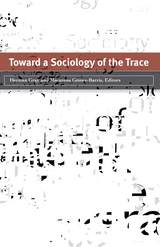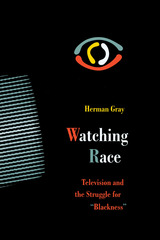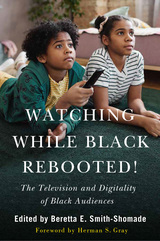4 books by Gray, Herman

Racism Postrace
Roopali Mukherjee, Sarah Banet-Weiser, and Herman Gray, editors
Duke University Press, 2019
With the election of Barack Obama, the idea that American society had become postracial—that is, race was no longer a main factor in influencing and structuring people's lives—took hold in public consciousness, increasingly accepted by many. The contributors to Racism Postrace examine the concept of postrace and its powerful history and allure, showing how proclamations of a postracial society further normalize racism and obscure structural antiblackness. They trace expressions of postrace over and through a wide variety of cultural texts, events, and people, from sports (LeBron James's move to Miami), music (Pharrell Williams's “Happy”), and television (The Voice and HGTV) to public policy debates, academic disputes, and technology industries. Outlining how postrace ideologies confound struggles for racial justice and equality, the contributors open up new critical avenues for understanding the powerful cultural, discursive, and material conditions that render postrace the racial project of our time.
Contributors. Inna Arzumanova, Sarah Banet-Weiser, Aymer Jean Christian, Kevin Fellezs, Roderick A. Ferguson, Herman Gray, Eva C. Hageman, Daniel Martinez HoSang, Victoria E. Johnson, Joseph Lowndes, Roopali Mukherjee, Safiya Umoja Noble, Radhika Parameswaran, Sarah T. Roberts, Catherine R. Squires, Brandi Thompson Summers, Karen Tongson, Cynthia A. Young
Contributors. Inna Arzumanova, Sarah Banet-Weiser, Aymer Jean Christian, Kevin Fellezs, Roderick A. Ferguson, Herman Gray, Eva C. Hageman, Daniel Martinez HoSang, Victoria E. Johnson, Joseph Lowndes, Roopali Mukherjee, Safiya Umoja Noble, Radhika Parameswaran, Sarah T. Roberts, Catherine R. Squires, Brandi Thompson Summers, Karen Tongson, Cynthia A. Young
[more]

Toward a Sociology of the Trace
Herman Gray
University of Minnesota Press, 2010
Using culture as an entry point, and informed by the work of contemporary social theorists, the essays in this volume identify and challenge sites where the representational dimension of social life produces national identity through scripts of belonging, or traces.
The contributors utilize empirically based studies of social policy, political economy, and social institutions to offer a new way of looking at the creation of meaning, representation, and memory. They scrutinize subjects such as narratives in the U.S. coal industry's change from digging mines to removing mountaintops; war-related redress policies in post-World War II Japan; views of masculinity linked to tequila, Pancho Villa, and the Mexican Revolution; and the politics of subjectivity in 1970s political violence in Thailand.
Contributors: Sarah Banet-Weiser, U of Southern California; Barbara A. Barnes, U of California, Berkeley; Marie Sarita Gaytán; Avery F. Gordon, U of California, Santa Barbara; Tanya McNeill, U of California, Santa Cruz; Sudarat Musikawong, Willamette U; Akiko Naono, U of Kyushu; Rebecca R. Scott, U of Missouri.
[more]

Watching Race
Television and the Struggle for Blackness
Herman Gray
University of Minnesota Press, 1997
A classic examination of the cultural relationship between television and race--with a new introduction!
In the late 1980s and early 1990s television representations of African Americans exploded on the small screen. Starting with the portrayal of blacks on series such as The Jack Benny Show and Amos 'n' Andy and continuing through The Cosby Show and In Living Color, Gray shows how the meaning of blackness on screen has changed through the years.
"Finally, a book that moves out of the prison house of stereotypes, beyond the common yet simplistic dichotomies of ‘positive' versus ‘negative' images. Herman Gray brilliantly and persuasively turns our attention to the more complicated issue of the politics of representation." --Robin D. G. Kelley, New York University
"This is a complex, subtle, and very important book. Gray argues that television is the site where key racial moments (Rodney King, Hill-Thomas hearings, Simpson trial, Los Angeles riots) have been staged and interpreted for the American public." --Contemporary Sociology
"Herman Gray's absorbing book offers incisive analysis of the important, often fierce battles being waged in the black-and-white representational landscape of commercial television." --Patricia Williams, author of The Alchemy of Race and Rights
Herman Gray is professor of sociology at the University of California, Santa Cruz. He is also the author of Producing Jazz and has appeared in the documentaries Color Adjustment and Signal to Noise.
[more]

Watching While Black Rebooted!
The Television and Digitality of Black Audiences
Beretta E. Smith-Shomade
Rutgers University Press, 2024
Watching While Black Rebooted: The Television and Digitality of Black Audiences examines what watching while Black means in an expanded U.S. televisual landscape. In this updated edition, media scholars return to television and digital spaces to think anew about what engages and captures Black audiences and users and why it matters. Contributors traverse programs and platforms to wrestle with a changing television industry that has exploded and included Black audiences as a new and central target of its visioning. The book illuminates history, care, monetization, and affect. Within these frames, the chapters run the gamut from transmediation, regional relevance, and superhuman visioning to historical traumas and progress, queer possibilities, and how televisual programming can make viewers feel Black. Mostly, the work tackles what the future looks like now for a changing televisual industry, Black media makers, and Black audiences.
Chapters rethink such historically significant programs as Roots and Underground, such seemingly innocuous programs as Soul Food, and such contemporary and culturally complicated programs as Being Mary Jane and Atlanta. The book makes a case for the centrality of these programs while always recognizing the racial dynamics that continue to shape Black representation on the small screen. Painting a decidedly introspective portrait across forty years of Black television, Watching While Black Rebooted sheds much-needed light on under examined demographics, broadens common audience considerations, and gives deference to the preferences of audiences and producers of Black-targeted programming.
Chapters rethink such historically significant programs as Roots and Underground, such seemingly innocuous programs as Soul Food, and such contemporary and culturally complicated programs as Being Mary Jane and Atlanta. The book makes a case for the centrality of these programs while always recognizing the racial dynamics that continue to shape Black representation on the small screen. Painting a decidedly introspective portrait across forty years of Black television, Watching While Black Rebooted sheds much-needed light on under examined demographics, broadens common audience considerations, and gives deference to the preferences of audiences and producers of Black-targeted programming.
[more]
READERS
Browse our collection.
PUBLISHERS
See BiblioVault's publisher services.
STUDENT SERVICES
Files for college accessibility offices.
UChicago Accessibility Resources
home | accessibility | search | about | contact us
BiblioVault ® 2001 - 2024
The University of Chicago Press









